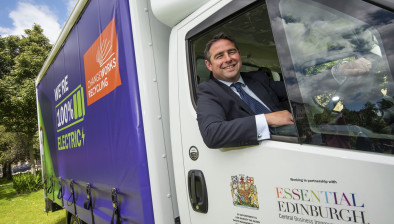New research into metering and billing of district heating schemes
 Social landlords in the UK need to carefully consider how they bill residents for heating in district heating schemes, says new research findings published by environmental charity Changeworks.
Social landlords in the UK need to carefully consider how they bill residents for heating in district heating schemes, says new research findings published by environmental charity Changeworks.
“Identifying the fair share: billing for district heating” investigates the experiences of social landlords and residents with district heating, specifically billing and resident engagement. The research, funded by eaga Charitable Trust, identifies learnings for current and future schemes. Findings are particularly relevant as new requirements have been placed on district heating scheme owners by the Heat Network (Metering and Billing) Regulations 2014, the Scottish Government is looking to increase the number of district heating schemes and the UK government is supporting local authorities to explore heat network opportunities.
Research findings highlight acute challenges faced by landlords with metering. Given the additional metering requirements of the Heat Network Regulations 2014, the research lessons learned are pertinent.
The research found social landlords and scheme residents had mixed experiences of district heating. Landlords often found scheme management challenging due to their complexity and common problems encountered. For example, a fault with heat meters could cause billing errors which could then lead to tenant complaints. However, landlords generally felt they overcame these challenges and district heating was successful in providing affordable heating.
Most residents were satisfied with district heating, with 75 per cent of those surveyed saying they preferred it to their old heating system. A likely contributing factor is residents’ dissatisfaction with other heating systems, such as electric storage heaters.
Landlords generally took two approaches to billing: a fixed fee or ‘heat with rent’ arrangement where residents pay a fixed amount regardless of usage, or a ‘variable rate’ where residents pay the amount of heat consumed. There was no consensus on the best approach, landlords experienced successes and difficulties with each.
Residents preferred a variety of billing and payment options, for example, heat with rent, direct debit or prepayment (where residents pay for heat in advance). To improve a scheme’s success, research recommendations encourage social landlords to offer residents billing and payment options and to consult with residents for their views during the planning phase.
Tessa Clark, senior consultant with Changeworks, said: “All the landlords we spoke to have faced challenges with district heating and despite these, it can work. We always talk about the technology but what’s equally important is to consider the people: how do they interact with the system and how to they pay for their heat? District heating is about providing affordable warmth and reducing fuel poverty for tenants and our research confirms, the billing needs to work for them.”
The research report, summary and appendices are available on the Changeworks website.








